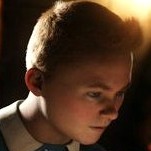
It is playing with fire, or ‘falling down both sides of the blade’ (as the Tindersticks lyrics from the end credits song would say) to put oneself in a potential love triangle. That 70s hit song Torn Between Two Lovers may have been schlocky, but it was written for a reason. Spending time with an old and not entirely extinguished flame when in a supposedly happy relationship is always a bad idea. It will be an ill-advised test of willpower at best, and at worst the height of hubris. That’s what happens in director Claire Denis’s romantic drama Both Sides of the Blade, which Denis wrote with co-screenwriter Christine Angot, based on Angot’s 2018 novel Un Tournant de Vie (A Turning Point of Life). They’ve created a visceral, intense slow burn about a destructive love triangle that spirals out of control with the help of stars Juliette Binoche, Vincent Lindon, and Grégoire Colin. Denis won the Silver Bear for Best Director at the 72nd Berlin International Film Festival for her work on the film.
In the opening scenes, Sara (Binoche) and her husband Jean (Lindon) are demonstratively in love. They have the easy, playful interaction of two people who choose to connect and actively listen to each other. Sara is a radio presenter, and Jean is a former professional rugby player who did time in prison, for what exactly it’s unclear. When Sara sees her former lover and Jean’s longtime friend François on the street for the first time since she chose Jean, she is overwhelmed. It turns out Jean has taken the job François has offered him as a talent scout for his new sports agency. This is a chance for Jean to really restart his life, and actively participate emotionally and financially with his mixed-race teenaged son Marcus (Issa Perica). This new arrangement leads to Sara seeing François again, and old feelings come to the surface for both of them, putting Jean and Sara’s 10 year heretofore-happy life together at risk.
Though a relationship drama, Both Sides of the Blade leverages a number of attributes of the noir genre. There is use of light and shadow throughout. The characters have intentionally underdeveloped personal histories. It can be safely said Binoche’s Sara is playing something of a femme fatale, as she, however unwittingly, plays the two men against each other. The omni-present score is brooding and intense, reframing some scenes that might otherwise seem innocuous with a sense of foreboding. I suppose a spiraling affair, with its lies, betrayal, and rationalizations could be seen as a murder mystery, if the corpse is love.
For the review in its entirety go to AWFJ.org HERE.



